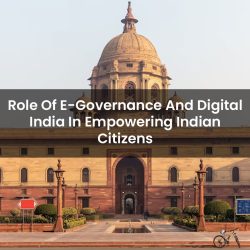India has the highest youth population, which is necessary for any developing country to push towards being a developed nation. With a major chunk of the population ranging between 18 and 29 age demographic, the economy has crazy potential to grow exponentially. However, as time progresses, the gap between the rich and the poor has increased rapidly. One of the primary reasons the youth is impoverished is the unstable nature of the job market and rampant unemployment.
To tackle this problem and decrease the skill gap in the masses, the Pradhan Mantri Kaushal Vikas Yojna (PMKVY) was launched on July 15, 2015. The aim was to introduce vocational skills to equip people with the tools needed to earn a livelihood.
This article will cover this government scheme in great detail. We will be discussing its need, inception, initiatives, and much more.
What is Pradhan Mantri Kaushal Vikas Yojana (PMKVY)?
Pradhan Mantri Kaushal Vikas Yojana (PMKVY), also known as the Pradhan Mantri Youth Training Program, is a skill development initiative by the Government of India that recognises and standardises skills.
The primary goal of PMKVY is to foster an interest in employable skills and to enhance the efficiency of potential and current daily wage earners. This is achieved by offering monetary awards and rewards, along with quality training. On average, each individual receives an award amount of ₹8,000 (US$100). Those who already possess a standard level of skill will receive recognition under the scheme, with an average award amount ranging from ₹2,000 to ₹2,500. In its initial year, the scheme aimed to distribute ₹15 billion (US$190 million).
Training programs are designed based on National Occupational Standards (NOS) and specific qualification packs developed for various skill sectors. These plans have been created by different Sector Skill Councils (SSCs) with industry participation. The National Skill Development Council (NSDC) serves as the coordinating and driving agency for PMKVY. The training provided under this scheme is free for the youth.
The project has been allocated a budget of ₹120 billion (US$1.5 billion) by the government. The scheme aims to train 10 million Indian youth from 2016 to 2020. As of July 18, 2016, 1.793 million candidates had been trained out of the 1.8 million who enrolled for the scheme.
Why was PMKVY started?
Most developed nations have made significant economic progress by enhancing the vocational and skill capabilities of their youth. Skill development and proficiency training have created a large talent pool that has driven national economic development. Numerous studies have shown a strong correlation between vocational education and per capita income. These studies indicate that vocational education positively impacts per capita income and employment, with short-term earnings increases often surpassing those from higher education.
In India, the importance of vocational education was highlighted as early as 1966 by the Kothari Commission, which recommended the introduction of vocational courses at the higher secondary level. This emphasis was reiterated in the 1986 New Education Policy, which introduced Socially Useful Productive Work (SUPW) as a separate subject. The 2020 Education Policy has further reinforced the need to integrate vocational education into mainstream education and introduced Lok Vidya.
However, the growth of vocational education in India over the years has been disappointing. According to an assessment by the National Institute of Open Schooling, only 2% of individuals aged 15-29 have received formal vocational training, and only 8% have received non-formal vocational training. The 12th Five-Year Plan (2012w-2017) estimated that less than 5% of the Indian workforce aged 19-24 received formal vocational education.
To address this gap, the Pradhan Mantri Kaushal Vikas Yojana (PMKVY) was launched with the vision of providing skill and vocational training to the youth. This program identifies specific sectors and job roles for which youth across the country are enrolled for training. The objective of PMKVY is to equip young people with the skills needed to earn a dignified livelihood. It also aims to help dropouts enter the labour market without formal certification. Given the increasing demand for a skilled labour force, PMKVY seeks to bridge the gap between demand and supply by offering relevant skill development training. The policy aims to provide youth with the right skills to make them employable in the industry. As the economy grows, the country faces a dual challenge: poor employability among a large youth population and a shortage of trained quality resources. PMKVY aims to address this by providing industry-relevant skills and preparing youth for jobs and livelihoods.
A recent PMKVY study report by the National Skill Development Corporation (NSDC) indicated that over 90% of respondents were satisfied with the quality of trainers, curriculum adequacy, and infrastructure. However, only 36% of those trained and certified were satisfied with the placement assistance provided. Additionally, 73% of respondents acknowledged benefits from the program, mainly increased self-confidence and improved technical knowledge, but only 47% reported working in the domain of their training.
Objectives of Pradhan Mantri Kaushal Vikas Yojana (PMKVY)
The objective is to promote skill development among youth by providing monetary rewards for completing approved training programs. The key aims of the scheme are to:
- Encourage standardisation in the certification process and create a skills registry.
- Enable and mobilise a large number of Indian youth to undergo skill training, become employable, and earn a livelihood. The scheme also aims to increase the productivity of the existing workforce by aligning training and certification with the needs of the country.
- Provide monetary awards for skill certification to enhance the employability and productivity of youth by incentivising skill training.
- Reward candidates undergoing skill training at authorised institutions with an average monetary reward of ₹8,000 (Rupees Eight Thousand) per candidate.
- Benefit 2.4 million youth at an approximate total cost of ₹1,500 crore.
Strategy and Approach
The scheme has been meticulously planned by the government to maximise the impact and reach of the scheme:
- The scheme will provide monetary incentives to approximately 2.4 million youth who complete market-driven skill training and certification within one year of its implementation.
- The scheme will be implemented through both public-private and public-public partnerships.
- The National Skill Development Corporation (NSDC) will serve as the implementing agency for this scheme.
- All training and certification under the Recognition of Prior Learning (RPL) will focus on developing skills in specific growth sectors.
- Assessment and training bodies will be separate to ensure transparency and objectivity, with no overlap of roles.
- The monetary reward will be fully funded by the Ministry of Skill Development and Entrepreneurship, Government of India, and will be disbursed directly to beneficiaries’ bank accounts via bank transfer. To facilitate smooth disbursement, the entire fund, along with additional implementation funds, will be transferred to the National Skill Development Fund for further utilisation by NSDC.
Eligibility for Pradhan Mantri Kaushal Vikas Yojana
In line with the objectives stated above, this scheme applies to any candidate of Indian nationality who:
- Undergoes skill development training in an eligible sector by an eligible training provider as defined above.
- Is certified during one year from the date of the scheme’s launch by approved assessment agencies.
- Avails of this monetary award for the first and only time during the operation of this scheme.
- Meets any other criteria defined by the Sector Skill Councils for respective job roles.
Eligible Sectors and Job Roles under PMKVY
Training under the Pradhan Mantri Kaushal Vikas Yojana (PMKVY) will adhere to standards set by industry-driven bodies, specifically the Sector Skills Councils (SSCs). These standards include National Occupational Standards (NOS) and Qualification Packs (QPs) for specific job roles. The identified job roles for levels 1 to 4 align with the National Skills Qualifications Framework (NSQF) and primarily target school and college dropouts.
Skill training targets will be determined based on the assessment of skill demand and the findings of ‘Skill Gap Studies’. These targets will be allocated to SSCs by the National Skill Development Corporation (NSDC) in consultation with SSCs, States/UTs, and Central Ministries/Departments, under the guidance of the PMKVY Steering Committee.
The targets for skill training will be aligned with the demand generated by central government flagship programs such as ‘Swachh Bharat’, ‘Make in India’, ‘Digital India’, ‘National Solar Mission’, and others.
Eligible Providers
NSDC training partners undergo a thorough vetting process before registration. Government-affiliated training centers and other training partners will be approved by the SSCs based on NSDC guidelines. Even government-affiliated training providers must undergo due diligence as outlined in the process manual. Each training partner is responsible for its entire franchise network and the infrastructure of training centers, which will be subject to monitoring. Only the first level of franchising is allowed and must be declared in advance.
Key Features of Pradhan Mantri Kaushal Vikas Yojana
- Training under PMKVY follows National Occupational Standards (NOS) and Qualification Packs (QPs) for specific job roles, as defined by industry-driven bodies, namely the Sector Skills Councils (SSCs).
- The curriculum includes not only technical skills but also soft skills training, personal grooming, behavioral change for cleanliness, and good work ethics.
- Skill training is based on the assessment of skill demand and findings from ‘Skill Gap Studies’.
- Training is aligned with national flagship programs such as “Swachh Bharat”, “Digital India”, “Make in India”, and “National Solar Mission”.
- Training providers must undergo due diligence according to PMKVY guidelines issued by NSDC before registration. This ensures the quality of training provided to the youth.
- Trainees with prior skills and experience will be assessed and given monetary rewards for undergoing the assessment.
- Beneficiaries receive monetary rewards upon successful completion of training and assessment.
- Higher incentives are provided for training in the manufacturing, construction, and plumbing sectors.
- The reward amount varies by job role and sector, ensuring fair compensation based on training level and industry demand.
- Monetary rewards are directly transferred to the beneficiary’s bank account without intermediaries, ensuring transparency and efficiency.
- The Aadhaar number is used for the unique identification of each beneficiary.
- The government provides mentoring support to candidates who have completed the training and are seeking employment opportunities.
These features collectively aim to enhance the employability of Indian youth, align training with industry needs, and ensure a transparent and efficient system.
Monetary Rewards under PMKVY
The monetary reward for various job roles within a sector varies according to the job role levels. This amount is determined by considering factors like the cost of training, trainees’ willingness to pay, and other relevant considerations. Higher incentives are provided for training in the manufacturing, construction, and plumbing sectors.
The reward amounts for Skills Training and Recognition of Prior Learning (RPL) are as follows:
Skills Training
- Level 1 & 2: ₹7,500 for Manufacturing, Plumbing, and Construction sectors; ₹5,000 for other sectors.
- Level 3 & 4: ₹10,000 for Manufacturing, Plumbing, and Construction sectors; ₹7,500 for other sectors.
- Level 5 & 6: ₹12,500 for Manufacturing, Plumbing, and Construction sectors; ₹10,000 for other sectors.
Recognition of Prior Learning (RPL)
- Level 3 & 4: ₹2,500 for Manufacturing, Plumbing, and Construction sectors; ₹2,000 for other sectors.
Direct Fund Transfer: PMKVY ensures complete transparency in funding skill training. Monetary rewards are directly transferred to the trainee’s bank account without any intermediaries. The Aadhaar number is used for the unique identification of each candidate.
FAQs on Pradhan Mantri Kaushal Vikas Yojana
Who is eligible for PMKVY courses?
To be eligible for PMKVY courses, you must:
- Be an Indian national with valid identity proof such as a Voter ID, Aadhaar card, or a bank account.
- Be an unemployed youth or a school/college dropout.
What is the use of a PMKVY certificate?
The PMKVY provides a Skill India card and valid certification, which can be used to apply for various jobs and earn a livelihood. Additionally, PMKVY extends financial and placement assistance to all candidates who receive certification.
What is the last date for PMKVY registration in 2024?
The deadline for enrolment under PMKVY 4.0 across all sub-schemes (STT / SP / RPL / Skill India Centers and RFP allocations) is March 31, 2024. Enrolment will close on SIDH at 11:59 PM on that date.
Who can apply for the Skill India program?
The Skill India program is available to Indian youth who are:
- Unemployed or school/college dropouts.
- Possess an Aadhaar card.
- Hold a bank account.
- Have any other verifiable ID such as PAN or Voter ID.
- Meet all other criteria defined by the Sector Skills Councils (SSCs) for the respective job roles.
What is the salary of a PMKVY trainer?
The salary for a PMKVY trainer in India ranges from ₹1.2 Lakhs to ₹3.2 Lakhs annually, with an average salary of around ₹2.3 Lakhs per year. Salary estimates are based on the latest data received from various employees of the PMKVY.















